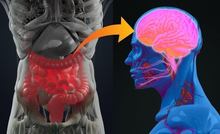Are probiotics and prebiotics effective for depression and anxiety? A summary of the largest review so far….
There is strong interest in the potential of probiotics and prebiotics as a treatment for anxiety and depression. The results so far have been mixed, comprising both positive and negative findings. It has been difficult to form any firm conclusions given the significant variability in studies conducted so far. Liu and colleagues [1] have recently published the largest and most comprehensive analysis of the research to date. Here is my brief summary of their findings.
Summary of prebiotic trials for anxiety/depression
- 7 studies examining the effects of prebiotics on anxiety and/or depression were identified.
- Prebiotics investigated included bimuno-galactooligosaccharide (B-GOS), fructooligosaccharide (FOS), GOS, and short-chain FOS (scFOS)
- Trials lasted from 4 hours to 4 weeks
- Conclusions: There was no difference observed between prebiotics and placebo for either anxiety or depression. However, these findings should be considered preliminary given the limited studies conducted so far. Also, only one study was conducted on a clinically depressed population. The rest were conducted on community-based populations with no diagnosis of depression and/or anxiety.
Summary of probiotic trials for anxiety and/or depression
29 probiotic trials were identified. With the exception of two trials focusing exclusively on Bifidobacterium longum and Bacillus coagulans, all probiotic trials investigated lactobacilli alone or in combination with species from other genera, most often Bifidobacterium.
Probiotic depression trials (23 trials)
- Duration of trials ranged from 8 days to 45 weeks
- Compared to the placebo, probiotic administration was associated with lower depressive symptoms (effect size = .24; indicating a small effect size)
- Probiotic treatment was effective in trials lasting longer than one month (effect size = .28). However, when it was used for less than one month it was ineffective.
- Greater treatment effects were observed in clinically depressed or medical populations (effect size = .45; indicating a moderate effect size) compared to community populations (effect size = .09; indicating a very small treatment effect). However, there is a dearth of studies on people with clinical depression (4 studies only).
- Greater effects were seen in trials using Lactobacillus in combination with other genera. However, this conclusion should be considered tentative as all Lactobacillus-only studies were conducted on non-clinical populations.
- Conclusions: Probiotic treatment lasting greater than 4 weeks seems to be effective for the treatment of depression in adults with clinical depression. Probiotics containing Lactobacillus in combination with other genera seem to be the most effective. However, these conclusions need to be considered tentative. There are still not enough studies to be able to recommend any specific probiotic strain or species (taken in isolation or in combination).
Probiotic anxiety trials (22 trials)
- Probiotic administration was associated with lower anxiety symptoms compared to the placebo (effect size = .10; small effect size)
- All studies examined the effects of probiotics on anxiety in community populations. There were no studies examining its effectiveness in adults with clinically diagnosed anxiety.
- Conclusions: Probiotic administration may be effective for the treatment of anxiety. However, further trials conducted on clinical populations need to be conducted before more definitive conclusions can be made. There are not enough studies to be able to recommend any specific probiotic strain or species.
Overall, these studies suggest that probiotics may be effective for the treatment of depression and anxiety. However, more studies are required. It will also be important to identify the most effective probiotic strain (or strains) for the alleviation of anxiety and/or depressive symptoms.
With the increasing technology associated with microbiome testing, treatments are likely to be more effective when probiotic (and prebiotic) administration is more personalised. This is when the type of probiotics given are based on a person’s unique microbial profile. In the meantime, given the safety associated with probiotics, it may be worth a trial for people with depression and/or anxiety to see if it may help to alleviate symptoms.
OUT NOW! PI Therapy Workbook. A Complete System for Treating Depression and Anxiety. CLICK HERE to get your copy now!
References
- Liu RT, Walsh RFL, and Sheehan AE. Prebiotics and probiotics for depression and anxiety: A systematic review and meta-analysis of controlled clinical trials. Neurosci Biobehav Rev. 2019 Jul;102:13-23 link to the article
